
7 Great Novels About Real People
This content contains affiliate links. When you buy through these links, we may earn an affiliate commission.
Sometimes novels about real people can go places where nonfiction can’t, and that’s especially true when it comes to biography. I love a good well-researched biography, but there are limits to what a responsible biographer can learn and share. Nonfiction is unlikely, for instance, to plumb a person’s deepest, most secret thoughts. And there are some people for whom the historical record is so scant that a biography simply won’t reveal much.
That’s where fiction can come in. Novelists are able to fill in the gaps with their own imaginings about what people were like, what they thought, and how they felt. As long as we understand that the books are speculative, they can be a rewarding way to get new insights into the lives of people from the past.
So with that in mind, here’s a sampling a great novels about real people. I’ve chosen books about people from a variety of times and places, with varying degrees of faithfulness to history. Whose story would you like to see fictionalized?
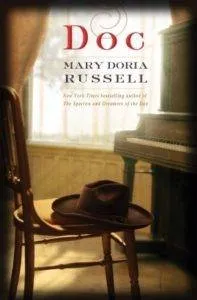 Doc by Mary Doria Russell. This contemplative western focuses on Doc Holliday’s years in Dodge City, where he first meets Wyatt Earp and Kate Harony. Russell researched extensively to try to get at the real story of what kind of man Holliday was, and she depicts him here as an intellectual with poor health, a gambling addiction, and a kind heart. Although most people probably know about Holliday from films about the gunfight at the OK Corral, that famous showdown doesn’t come until the follow-up, Epitaph. Doc gives us a glimpse of what the man may have been like before.
Doc by Mary Doria Russell. This contemplative western focuses on Doc Holliday’s years in Dodge City, where he first meets Wyatt Earp and Kate Harony. Russell researched extensively to try to get at the real story of what kind of man Holliday was, and she depicts him here as an intellectual with poor health, a gambling addiction, and a kind heart. Although most people probably know about Holliday from films about the gunfight at the OK Corral, that famous showdown doesn’t come until the follow-up, Epitaph. Doc gives us a glimpse of what the man may have been like before.
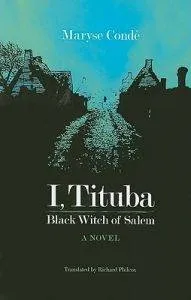 I, Tituba, Black Witch of Salem by Maryse Condé. If you’ve seen or read Arthur Miller’s The Crucible or any other literature related to the Salem Witch Trials, you will probably know the name Tituba. Condé gives her voice, letting her tell the story of her birth in Barbados through her years in Salem and beyond. Because little is known about Tituba beyond the trials, Condé’s version is speculative, but built on history and traditions of the Caribbean.
I, Tituba, Black Witch of Salem by Maryse Condé. If you’ve seen or read Arthur Miller’s The Crucible or any other literature related to the Salem Witch Trials, you will probably know the name Tituba. Condé gives her voice, letting her tell the story of her birth in Barbados through her years in Salem and beyond. Because little is known about Tituba beyond the trials, Condé’s version is speculative, but built on history and traditions of the Caribbean.
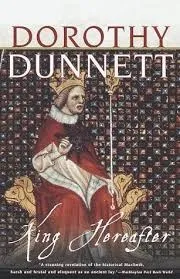 King Hereafter by Dorothy Dunnett. As far as I’m concerned, Dunnett is the queen of historical fiction. Her novels are rich in detail and intrigue, and her central characters are compelling if not always lovable. Here, she takes the Scottish king Macbeth as her subject, positing that Macbeth and Thorfinn, an 11th century earl, are one and the same. I don’t know that her theory has anything like a sound basis in history, but I don’t care. The novel is so good and the characters so well-drawn that I’m willing to go along with it. The relationship between Thorfinn/Macbeth and his wife, Groa, still puts a lump in my throat to think about.
King Hereafter by Dorothy Dunnett. As far as I’m concerned, Dunnett is the queen of historical fiction. Her novels are rich in detail and intrigue, and her central characters are compelling if not always lovable. Here, she takes the Scottish king Macbeth as her subject, positing that Macbeth and Thorfinn, an 11th century earl, are one and the same. I don’t know that her theory has anything like a sound basis in history, but I don’t care. The novel is so good and the characters so well-drawn that I’m willing to go along with it. The relationship between Thorfinn/Macbeth and his wife, Groa, still puts a lump in my throat to think about.
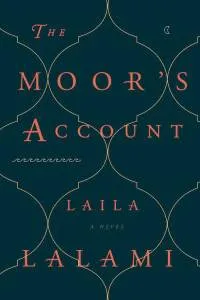 The Moor’s Account by Laila Lalami. This account of the 1527 Narváez expedition to Florida is presented from the point of view of Estevancio, aka Mustafa al-Zamori, one of the expedition’s only survivors and one of the first Africans to come to the continental United States. Not much is known about his history, so Lalami creates her own back story about the events that led up to his enslavement and then fills in the gaps of what we know about the expedition that put his name in the history books. The result is an exciting story of disaster and survival.
The Moor’s Account by Laila Lalami. This account of the 1527 Narváez expedition to Florida is presented from the point of view of Estevancio, aka Mustafa al-Zamori, one of the expedition’s only survivors and one of the first Africans to come to the continental United States. Not much is known about his history, so Lalami creates her own back story about the events that led up to his enslavement and then fills in the gaps of what we know about the expedition that put his name in the history books. The result is an exciting story of disaster and survival.
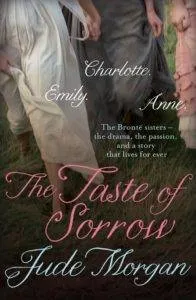 The Taste of Sorrow by Jude Morgan (American title Charlotte and Emily). This novel covers the lives and writing careers of the Brontë sisters. Morgan does a marvelous job showing each sister’s distinct personality, and, despite the American title, Anne gets as much attention as Emily. Charlotte’s perspective, however, dominates, which makes sense given her longer life and career. As far as I know, this novel sticks closely to recorded facts about the sisters. Morgan avoids, for example, trying to come up with real-life analogues for Heathcliff and Rochester, although he does show the likely real-life inspiration for Lowood School and other elements of the novels.
The Taste of Sorrow by Jude Morgan (American title Charlotte and Emily). This novel covers the lives and writing careers of the Brontë sisters. Morgan does a marvelous job showing each sister’s distinct personality, and, despite the American title, Anne gets as much attention as Emily. Charlotte’s perspective, however, dominates, which makes sense given her longer life and career. As far as I know, this novel sticks closely to recorded facts about the sisters. Morgan avoids, for example, trying to come up with real-life analogues for Heathcliff and Rochester, although he does show the likely real-life inspiration for Lowood School and other elements of the novels.
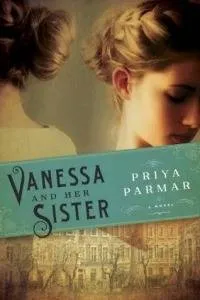 Vanessa and Her Sister by Priya Parmar. Parmar picks up the story of Vanessa Bell, Virginia Woolf, and their circle in 1905, the year the siblings first moved to Bloomsbury together. E.M. Forster, Lytton Strachey, and John Singer Sargent are just a few of the famous people who make appearances. Presented in the form of Vanessa’s diary, with letters, postcards and other momentos scattered throughout, the novel gives readers an imaginative glimpse into the day-to-day life of this famous family.
Vanessa and Her Sister by Priya Parmar. Parmar picks up the story of Vanessa Bell, Virginia Woolf, and their circle in 1905, the year the siblings first moved to Bloomsbury together. E.M. Forster, Lytton Strachey, and John Singer Sargent are just a few of the famous people who make appearances. Presented in the form of Vanessa’s diary, with letters, postcards and other momentos scattered throughout, the novel gives readers an imaginative glimpse into the day-to-day life of this famous family.
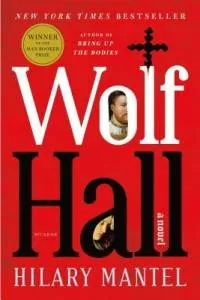 Wolf Hall by Hillary Mantel. Books about the Tudors are too numerous to name, but this one by Hillary Mantel, as well as its sequel, Bring Up the Bodies, stands out from the pack. First, the writing is top-notch. But also, she chooses to focus on Thomas Cromwell, providing a fresh, but historically grounded perspective on his life at the court of Henry VIII. Now when will we get that third book?
What are your favorite novels about real people?
Wolf Hall by Hillary Mantel. Books about the Tudors are too numerous to name, but this one by Hillary Mantel, as well as its sequel, Bring Up the Bodies, stands out from the pack. First, the writing is top-notch. But also, she chooses to focus on Thomas Cromwell, providing a fresh, but historically grounded perspective on his life at the court of Henry VIII. Now when will we get that third book?
What are your favorite novels about real people?
 Doc by Mary Doria Russell. This contemplative western focuses on Doc Holliday’s years in Dodge City, where he first meets Wyatt Earp and Kate Harony. Russell researched extensively to try to get at the real story of what kind of man Holliday was, and she depicts him here as an intellectual with poor health, a gambling addiction, and a kind heart. Although most people probably know about Holliday from films about the gunfight at the OK Corral, that famous showdown doesn’t come until the follow-up, Epitaph. Doc gives us a glimpse of what the man may have been like before.
Doc by Mary Doria Russell. This contemplative western focuses on Doc Holliday’s years in Dodge City, where he first meets Wyatt Earp and Kate Harony. Russell researched extensively to try to get at the real story of what kind of man Holliday was, and she depicts him here as an intellectual with poor health, a gambling addiction, and a kind heart. Although most people probably know about Holliday from films about the gunfight at the OK Corral, that famous showdown doesn’t come until the follow-up, Epitaph. Doc gives us a glimpse of what the man may have been like before.
 I, Tituba, Black Witch of Salem by Maryse Condé. If you’ve seen or read Arthur Miller’s The Crucible or any other literature related to the Salem Witch Trials, you will probably know the name Tituba. Condé gives her voice, letting her tell the story of her birth in Barbados through her years in Salem and beyond. Because little is known about Tituba beyond the trials, Condé’s version is speculative, but built on history and traditions of the Caribbean.
I, Tituba, Black Witch of Salem by Maryse Condé. If you’ve seen or read Arthur Miller’s The Crucible or any other literature related to the Salem Witch Trials, you will probably know the name Tituba. Condé gives her voice, letting her tell the story of her birth in Barbados through her years in Salem and beyond. Because little is known about Tituba beyond the trials, Condé’s version is speculative, but built on history and traditions of the Caribbean.
 King Hereafter by Dorothy Dunnett. As far as I’m concerned, Dunnett is the queen of historical fiction. Her novels are rich in detail and intrigue, and her central characters are compelling if not always lovable. Here, she takes the Scottish king Macbeth as her subject, positing that Macbeth and Thorfinn, an 11th century earl, are one and the same. I don’t know that her theory has anything like a sound basis in history, but I don’t care. The novel is so good and the characters so well-drawn that I’m willing to go along with it. The relationship between Thorfinn/Macbeth and his wife, Groa, still puts a lump in my throat to think about.
King Hereafter by Dorothy Dunnett. As far as I’m concerned, Dunnett is the queen of historical fiction. Her novels are rich in detail and intrigue, and her central characters are compelling if not always lovable. Here, she takes the Scottish king Macbeth as her subject, positing that Macbeth and Thorfinn, an 11th century earl, are one and the same. I don’t know that her theory has anything like a sound basis in history, but I don’t care. The novel is so good and the characters so well-drawn that I’m willing to go along with it. The relationship between Thorfinn/Macbeth and his wife, Groa, still puts a lump in my throat to think about.
 The Moor’s Account by Laila Lalami. This account of the 1527 Narváez expedition to Florida is presented from the point of view of Estevancio, aka Mustafa al-Zamori, one of the expedition’s only survivors and one of the first Africans to come to the continental United States. Not much is known about his history, so Lalami creates her own back story about the events that led up to his enslavement and then fills in the gaps of what we know about the expedition that put his name in the history books. The result is an exciting story of disaster and survival.
The Moor’s Account by Laila Lalami. This account of the 1527 Narváez expedition to Florida is presented from the point of view of Estevancio, aka Mustafa al-Zamori, one of the expedition’s only survivors and one of the first Africans to come to the continental United States. Not much is known about his history, so Lalami creates her own back story about the events that led up to his enslavement and then fills in the gaps of what we know about the expedition that put his name in the history books. The result is an exciting story of disaster and survival.
 The Taste of Sorrow by Jude Morgan (American title Charlotte and Emily). This novel covers the lives and writing careers of the Brontë sisters. Morgan does a marvelous job showing each sister’s distinct personality, and, despite the American title, Anne gets as much attention as Emily. Charlotte’s perspective, however, dominates, which makes sense given her longer life and career. As far as I know, this novel sticks closely to recorded facts about the sisters. Morgan avoids, for example, trying to come up with real-life analogues for Heathcliff and Rochester, although he does show the likely real-life inspiration for Lowood School and other elements of the novels.
The Taste of Sorrow by Jude Morgan (American title Charlotte and Emily). This novel covers the lives and writing careers of the Brontë sisters. Morgan does a marvelous job showing each sister’s distinct personality, and, despite the American title, Anne gets as much attention as Emily. Charlotte’s perspective, however, dominates, which makes sense given her longer life and career. As far as I know, this novel sticks closely to recorded facts about the sisters. Morgan avoids, for example, trying to come up with real-life analogues for Heathcliff and Rochester, although he does show the likely real-life inspiration for Lowood School and other elements of the novels.
 Vanessa and Her Sister by Priya Parmar. Parmar picks up the story of Vanessa Bell, Virginia Woolf, and their circle in 1905, the year the siblings first moved to Bloomsbury together. E.M. Forster, Lytton Strachey, and John Singer Sargent are just a few of the famous people who make appearances. Presented in the form of Vanessa’s diary, with letters, postcards and other momentos scattered throughout, the novel gives readers an imaginative glimpse into the day-to-day life of this famous family.
Vanessa and Her Sister by Priya Parmar. Parmar picks up the story of Vanessa Bell, Virginia Woolf, and their circle in 1905, the year the siblings first moved to Bloomsbury together. E.M. Forster, Lytton Strachey, and John Singer Sargent are just a few of the famous people who make appearances. Presented in the form of Vanessa’s diary, with letters, postcards and other momentos scattered throughout, the novel gives readers an imaginative glimpse into the day-to-day life of this famous family.
 Wolf Hall by Hillary Mantel. Books about the Tudors are too numerous to name, but this one by Hillary Mantel, as well as its sequel, Bring Up the Bodies, stands out from the pack. First, the writing is top-notch. But also, she chooses to focus on Thomas Cromwell, providing a fresh, but historically grounded perspective on his life at the court of Henry VIII. Now when will we get that third book?
What are your favorite novels about real people?
Wolf Hall by Hillary Mantel. Books about the Tudors are too numerous to name, but this one by Hillary Mantel, as well as its sequel, Bring Up the Bodies, stands out from the pack. First, the writing is top-notch. But also, she chooses to focus on Thomas Cromwell, providing a fresh, but historically grounded perspective on his life at the court of Henry VIII. Now when will we get that third book?
What are your favorite novels about real people? 


